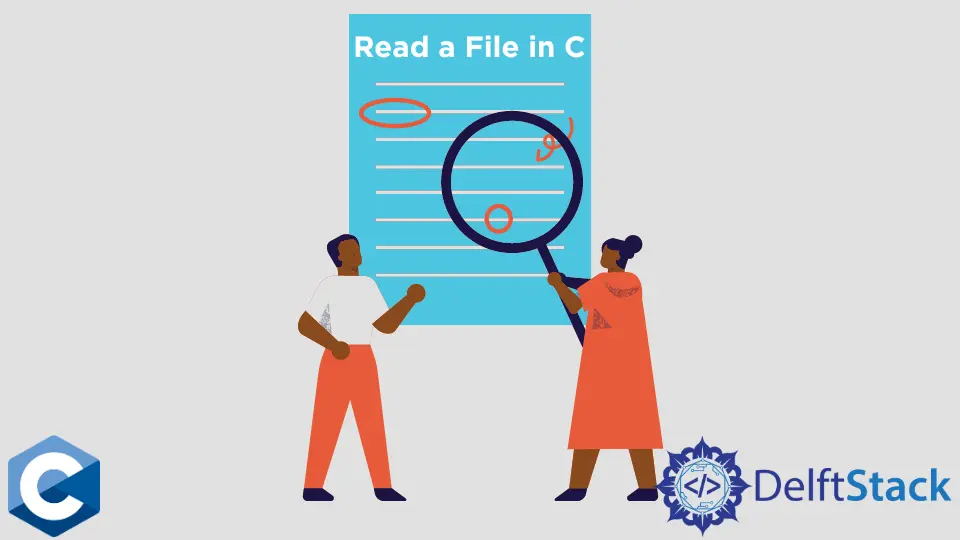C 語言中讀取檔案

本文將介紹關於如何在 C 語言中讀取文字檔案的多種方法。
C 語言中使用 fopen 和 fread 函式讀取文字檔案
fopen 和 fread 函式是 C 標準庫輸入/輸出函式的一部分。
fopen 用於將給定的檔案以流的形式開啟,並給程式一個控制代碼,以便根據需要對其進行操作。它需要兩個引數,檔名為 const char*字串,以及用預定義的值(r、w、a、r+、w+、a+)指定的開啟檔案的模式。當我們需要讀取一個檔案時,我們將 r 作為第二個引數傳入,以只讀模式開啟檔案。
另一方面,fread 函式是對已經開啟的檔案流進行讀取操作的主要函式。它的第一個引數是一個指向緩衝區的指標,讀取的位元組應該儲存在緩衝區中。第二個和第三個引數指定從流中讀取多少個專案以及每個專案的大小。最後一個引數是指向開啟的檔案流本身的 FILE*指標。
請注意,我們還使用 stat 函式來檢索檔案大小,並在一次 fread 呼叫中讀取全部內容。檔案大小也被傳遞給 malloc 函式,以分配足夠的空間來儲存整個檔案內容。不過要注意的是,動態的記憶體分配應該用 free 函式釋放,開啟的檔案用 fclose 關閉。
#include <stdio.h>
#include <stdlib.h>
#include <string.h>
#include <sys/stat.h>
int main(void) {
const char* filename = "input.txt";
FILE* input_file = fopen(filename, "r");
if (!input_file) exit(EXIT_FAILURE);
struct stat sb;
if (stat(filename, &sb) == -1) {
perror("stat");
exit(EXIT_FAILURE);
}
char* file_contents = malloc(sb.st_size);
fread(file_contents, sb.st_size, 1, input_file);
printf("%s\n", file_contents);
fclose(input_file);
free(file_contents);
exit(EXIT_SUCCESS);
}
使用 fopen 和 getline 函式讀取 C 語言中的文字檔案
另外,我們可以跳過使用 stat 函式檢索檔案大小,而使用 getline 函式對檔案的每一行進行迭代,直到到達終點。getline 從給定的檔案流中讀取輸入的字串。顧名思義,該函式檢索所有位元組,直到找到換行符。
getline 需要三個引數,其中第一個引數儲存讀取的位元組。它可以宣告為 char*,並設定為 NULL。同時,如果第二個引數是整數 0 的地址,getline 會自動為緩衝區分配動態記憶體,使用者應該釋放緩衝區,因此在程式結束時呼叫 free 函式。
需要注意的是,如果需要,這些引數可以有不同的值,所有這些引數在本函式手冊中都有說明。第三個引數是開啟檔案流的 FILE*指標。
#include <fcntl.h>
#include <stdio.h>
#include <stdlib.h>
#include <string.h>
#include <sys/stat.h>
int main(void) {
const char* filename = "input.txt";
FILE* input_file = fopen(filename, "r");
if (!input_file) exit(EXIT_FAILURE);
char* contents = NULL;
size_t len = 0;
while (getline(&contents, &len, input_file) != -1) {
printf("%s", contents);
}
fclose(input_file);
free(contents);
exit(EXIT_SUCCESS);
}
Founder of DelftStack.com. Jinku has worked in the robotics and automotive industries for over 8 years. He sharpened his coding skills when he needed to do the automatic testing, data collection from remote servers and report creation from the endurance test. He is from an electrical/electronics engineering background but has expanded his interest to embedded electronics, embedded programming and front-/back-end programming.
LinkedIn